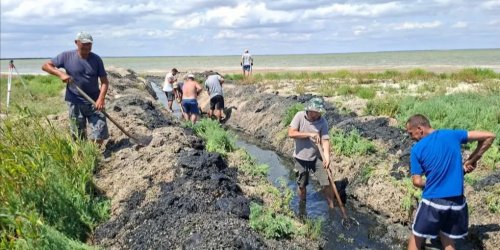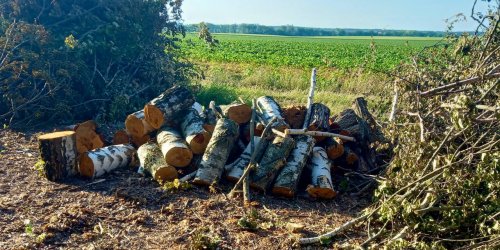Numerous environmental NGOs have issued statements condemning the restrictions on the independence of anti-corruption bodies in Ukraine contained in draft law No. 12414, which was passed by the Verkhovna Rada and signed by Ukrainian President Volodymyr Zelensky.
EcoPolitic has compiled statements from environmental activists and their arguments against the adoption of this document.
What caused a wide public response
On July 22, the Verkhovna Rada adopted bill No. 12414 “On Amendments to the Criminal Procedure Code of Ukraine Regarding the Specifics of Pre-trial Investigation of Criminal Offenses Related to the Disappearance of Persons Under Special Circumstances During Martial Law.” On the same day, it was signed by the head of state.
According to anti-corruption agencies and the public, amendments were made to the bill that effectively destroy the independence of the National Anti-Corruption Bureau (NABU) and the Specialized Anti-Corruption Prosecutor's Office (SAP) and subordinate their activities to the prosecutor general appointed by the president without any competition.
The public reaction to this legislative decision was immediate and extremely negative: thousands of people took to the streets in protest in many cities across the country. Civil society organizations, anti-corruption activists, journalists, and some politicians strongly condemned the adoption of the law, calling it a “return to the Yanukovych era” and an attempt to destroy the key anti-corruption achievements of the Revolution of Dignity.
Ukraine's international partners also expressed concern about this and reminded that the independence of anti-corruption institutions is a key requirement and condition for further European integration and financial assistance.
What risks to the environment do eco-activists see?
The largest association of pro-climate civil society organizations in Ukraine, the Ukrainian Climate Network (UСM), stated that draft law No. 12414 not only limits the independence of anti-corruption bodies, but also creates conditions for increased impunity for the destructive impact on Ukraine's environment.
UCM members believe that the lack of effective control and punishment for corruption offences will create even more opportunities for projects and schemes that ignore environmental standards and lead to the destruction of unique natural ecosystems.
“There will be many more examples of mountain pastures being built up with wind turbines, uncontrolled extraction of minerals, and unauthorized discharges if we remain silent,” the activists are convinced.
The Ukrainian Nature Conservation Group (UNCG) noted that this law was adopted “in violation of the regulations, contrary to Ukraine's European integration commitments, without prior public discussion or even notification of the advisability of its introduction — that is, with total disregard for public opinion.”
“Where is the guarantee that tomorrow they will not want to abolish the environmental impact assessment procedure introduced as part of European integration in the same way? Destroy all environmental restrictions on logging? Abolish coastal protection zones? Pass laws on ‘foreign agents’?” the activists ask.
They recalled important environmental documents that have not been adopted for years: European integration laws on the Emerald Network or environmental control, nature conservation laws on land tax, and many others, without which it is impossible to complete the path to European integration.
The UPG is convinced that nature conservation is impossible without:
- the rule of law – “because if laws are worthless, nothing can stop the destruction of nature”;
- the fight against corruption – “because corruption allows those who destroy nature to obtain the necessary decisions and permits”;
- ensuring public participation in decision-making – “because it is people's concern for the preservation of their native land that is the basis of the nature conservation movement”;
- inevitability of responsibility for violating the law – “because impunity is an incentive to continue illegal logging, plowing, illegal construction of dams and windmills, extraction of minerals, etc.”
Environmentalists recalled that the situation is further aggravated by the liquidation of the specialized Ministry of Environmental Protection and Natural Resources of Ukraine, which “ensured balance and a system of checks and balances in decision-making on the conservation and use of natural resources.”
The NGO EcoCity stated that the adoption of bill No. 12414 is a direct threat to the development of transparent, safe, and comfortable cities. Activists explained that the weakening of anti-corruption oversight “creates a breeding ground for illegal construction, abuse in public procurement, non-transparent distribution of budget funds, and disregard for the needs of citizens in urban spaces.”
“Kickbacks, backroom deals, and political immunity may once again become the norm—at the cost of losing green spaces, quality mobility, accessibility, and trust in local authorities,” they emphasized.
The NGO Ecoclub also spoke out against the adoption of bill No. 12414, which, after being signed by the president, was given the number 4555-IX. Members of the organization believe that the lack of effective control and punishment for corruption will open up even more opportunities for projects and schemes that ignore environmental standards and cause the destruction of unique natural ecosystems. They warned that if society remains indifferent, cases of wind turbine construction in mountain pastures, uncontrolled extraction of minerals, and unauthorized discharges will increase significantly.
“Corruption destroys all spheres, including the environment,” emphasized the Ecoclub.
The NGO Razom We Stand believes that draft law No. 12414 threatens not only the independence of anti-corruption bodies, but also the very idea of rebuilding Ukraine according to European standards and principles of sustainable development.
“Without effective anti-corruption control, we risk seeing even more schemes that violate environmental standards — from barbaric resource extraction to the development of unique natural areas. This law also poses a direct threat to Ukraine's accession to the EU and post-war reconstruction,” the activists say.
They also reminded that independent anti-corruption institutions are key to attracting private investment, which will be very necessary for Ukraine's “green” recovery.
Activists from the NGO EcoLtava highlighted the following consequences of the adoption of draft law No. 12414 for the environmental sector:
- impunity for corrupt officials in subsoil use, forestry, and water management;
- the risk of “dropping” cases of illegal construction, reconstruction schemes, and shadow trade in permits;
- the restoration of “manual control” through the ability of the prosecutor general to block or redistribute cases.
“Weakening independent oversight means one thing: even more unpunished crimes against nature, communities, and the future. And this could turn into a disaster. The environmental community cannot stand aside,” said EcoLatvia.
Posts against bill No. 12414 have also been posted on the official pages of the NGOs EcoAction, Ecology – Law – Man, Plato, Zero Waste Lviv, and other organizations.
We would like to remind you that eco-activists recently stated that the Verkhovna Rada may unblock environmental impact assessment procedures for unscrupulous developers.





